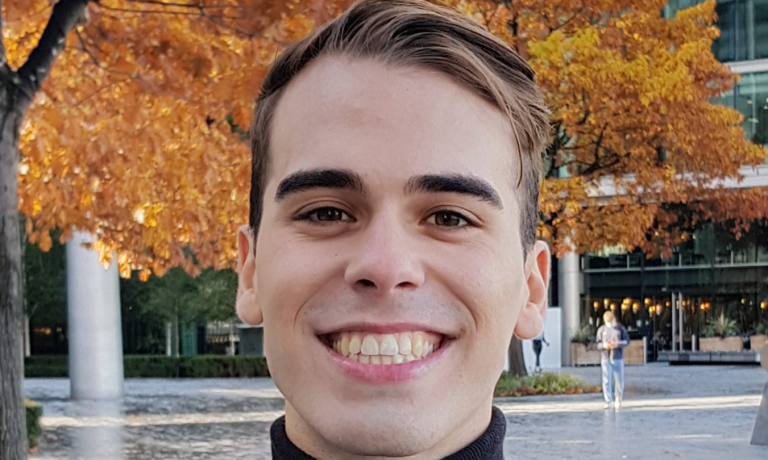Pride Month profile: Q&A with PhD student Javier Bautista
17 June 2021
This Pride Month we speak to PhD student Javier Bautista (IoN) about co-founding the LGBTQ+ STEM @UCL Network and the motivations behind this.

Javier Bautista is a PhD student at the UCL Queen Square Institute of Neurology and co-founder of the LGBTQ+ STEM @UCL Network. He became the Faculty Representative for Postgraduate Research Students this academic year and has won the prestigious Academic Representative of the Year award within the UCL Faculty of Brain Sciences.
Why did you choose to study at UCL?
Having previously lived in Spain and Armenia, I came to UCL to do my BSc in Biomedical Sciences and subsequently secured an MRC Doctoral Training Partnership. Following a year of rotations, I am currently pursuing a PhD as part of Dr Rob Pitceathly’s lab. UCL appealed to me due to the interdisciplinary and world-impacting research, encouraging clinical and non-clinical collaborations. I was also attracted by the promotion of disruptive thinking at UCL as the foundation of ground-breaking research, and I hope more equality, diversity and inclusion initiatives are supported to make the workplace more welcoming and diverse for students and staff.
Can you tell us about your research field?
My research involves characterising the role of cardiolipin, an important component of the mitochondrial membrane, in frontotemporal dementia (FTD). Cardiolipin plays an essential role in the structure and function of mitochondria - the powerhouse of the cell. Recently, impaired mitochondrial function and altered cardiolipin content has been linked to FTD. However, their direct contribution to the development of the disease remains unclear. My research project focuses on understanding the role of cardiolipin in mitochondrial dysfunction observed in models of FTD, while assessing cardiolipin as a biomarker for neurodegenerative diseases.
You co-founded the LGBTQ+ STEM @UCL Network, can you tell us what motivated you to do this?
During my undergraduate, I always felt like I had to hide my queerness in an academic environment, but once I became a PhD student, I started to take initiative and raise awareness of minority groups in science. That’s why in September 2020, I co-founded the LGBTQ+ STEM @UCL Network, a student-staff partnership that celebrates diversity and excellence at all career stages across all the STEM (Science, Technology, Engineering, and Mathematics) disciplines. Our aim is to broaden perceptions of LGBTQ+ identities in STEM disciplines at UCL and to foster a supportive environment where queer expression is visible. Over the last year, we have been organising events, ranging from social meet-ups to talks by invited speakers and we also collaborated in the organisation of the UCL LGBTQ+ STEM Festival 2021. If you would like to join us for future events and receive the newsletter, email lgbtq.stem@ucl.ac.uk or follow us on Twitter at @LGBTQ_STEMatUCL.
You have just been announced as the winner of the Representative of the Year award at the Faculty of Brain Sciences. Can you tell us about this role?
This academic year as the Faculty PGR representative has been a learning and rewarding experience, closely working with staff members and other students. I created, organised and executed the first ever PGR Student Conference in the Faculty of Brain Sciences, a successful long-day conference with 59 research talks supported by a ChangeMakers grant. This was a unique opportunity to highlight and promote the PGR work happening within the Faculty, as well as facilitating interdisciplinary collaboration. I also chair and organise the Faculty’s Rep Forum, which allows for productive discussions and feedback across departments and reps in the faculty, especially focusing on diversity, mental health and funding. This position has been a wonderful opportunity to establish new traditions, influence strategies and ensure that students are enjoying their experiences at UCL at their fullest. I am delighted to have received this award in recognition of my impact at the Faculty.
What are your future career goals?
I am interested in global health and healthcare, and the potential of developing new strategies that can have a direct impact in our community. I am acquiring many skills during my PhD studies that will be beneficial for the future, like being able to independently design and carry out projects, improving my critical reading and writing skills, alongside developing my presentation skills and resilience. Consultancy and policy making are some of the careers that I have in mind after my PhD, but I am looking forward to seeing how my research project develops in the coming years and where my journey takes me.
What would be your top tip for incoming students?
My top tip for incoming students would be to understand and respect the importance of taking breaks during your studies. Working long hours is so embedded in the culture of academia that is very easy to fall into this routine and forget about other factors in our lives - I am guilty myself of doing this many times! Remember to rest during the weekends, take holidays and prioritise yourself. This will have a positive impact in your mental health, boost your energy, improve your concentration and productivity.
 Close
Close

